Sunscreen is non-negotiable; while thick and creamy formulations can wreak havoc on acne-prone skin, lightweight, non-comedogenic variants work wonders. We spoke to celebrity dermatologist Dr Jaishree Sharad, who divulged details on all sunscreen-related queries.
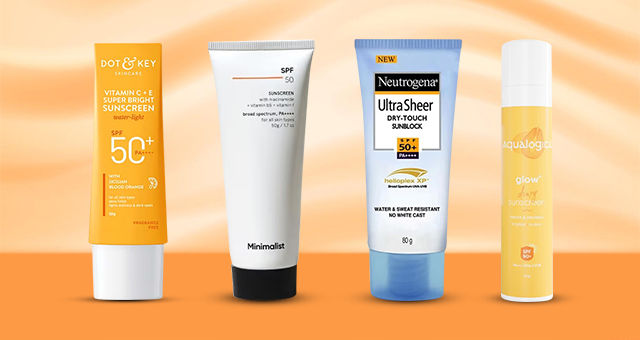
Table of Contents:
For a product that has so many delightful benefits, such as protecting your skin from sun damage and preventing fine lines and hyperpigmentation, some sunscreens come with a few downsides. Think formulas that are heavy on the skin and leave that dreadful white cast, and in some cases, even break you out. We’ve all been there at some point in our lives. But fret not, we spoke to Mumbai’s top dermatologist to break down every little detail about this common question – does sunscreen cause acne?
According to dermatologist Dr Jaishree Sharad, two things can cause sunscreen-related breakouts: clogged pores from comedogenic ingredients or sensitivity to chemical UV-blocking agents. In other words, mineral sunscreens can sit on top of your skin and gunk up pores, while chemical ones might irritate vulnerable skin. However, a study has also shown that specifically formulated sunscreens can decrease inflammation, curb post-inflammatory pigmentation, reduce the possibility of developing lesions, and limit flare-ups. For a lowdown on why sunscreens are non-negotiable in your skincare routine, click here.
Read on as Dr Jaishree Sharad gives you the 411 on sunscreen. Plus, consider all your sunscreen-related queries answered.
Q.1 Is my sunscreen breaking me out?
Yes, there are possibilities that your sunscreen might be causing you breakouts.
Q.2 Ingredients and types of sunscreens to avoid if you have sensitive or acne-prone skin:
- Chemical sunscreens absorb UV light and convert it to heat, which is released by the body. This heat can act as an occlusion to your skin and make you sweat more when combined with certain chemicals in sunscreens.
- Occlusive ingredients in sunscreens are great at retaining moisture but they can lead to trapping the sweat and increase sebum in your skin, which then clogs your pores and causes an increased amount of acne.
- Ingredients like avobenzone, oxybenzone, benzophenone, para-aminobenzoic acid (PABA) and methoxycinnamate (commonly found in waterproof sunscreens) can lead to breakouts.
- Coconut oil, cocoa butter, mineral oil, beeswax, and silicones can trigger breakouts in acne-prone skin. These ingredients do not let the sweat escape through your skin’s pores. As a result, sweat and dirt are trapped inside the pores, which ultimately causes irritation and breakouts.
- Common skin irritants like fragrances, artificial preservatives, dyes, and other chemicals present in sunscreen may cause acne and trigger breakouts.
Q.3 Does not wearing sunscreen make acne worse?
Yes, most certainly. Following are the reasons why not wearing a sunscreen can worsen acne :
- Post-inflammatory hyperpigmentation (PIH) from acne or acne scars tends to get much worse and darker from sun exposure.
- Post-Inflammatory Erythema (PIE) - sun exposure will cause an increase in inflammation and a reddish appearance of acne breakouts.
- UV exposure also triggers more breakouts and worsens Rosacea.
- Anti-acne treatments make your skin a little dry and more prone to sun damage, sometimes causing sun sensitivity. If you do not apply sunscreen during the daytime the skin can become more sensitive and will not tolerate the treatment causing a delay in the healing of acne.
- UV exposure damages the skin's natural barrier and causes acne to dry up leading to an increase in oil production, this excessive oil can result in more breakouts.
Q.4 What type of sunscreen is best for acne-prone/sensitive skin?
Q.5 Final Thoughts?
- It is important to use sunscreen daily so that concerns like Acne, PIH and Acne scars do not worsen.
- It's important to be careful with sun exposure when on an acne treatment because ingredients like retinoids, salicylic acid and physical procedures can make the skin more vulnerable to sunburn, that's why it is mandatory to apply sunscreen.
- Oily/Acne-prone Skin: If you have acne-prone skin, just make sure to select a sunscreen that is lightweight, non-greasy, oil-free and non-comedogenic.
- Research findings corroborate that ultraviolet radiation exposure has addictive properties, causing some people to engage in excessive tanning. If you’re looking to get rid of sun tan, check out these effective home remedies and the best sun tan removal products.
- Sensitive skin: Ingredients like zinc oxide have anti-inflammatory properties and are known to help reduce redness. Non-comedogenic sunscreens contain ingredients like niacinamide which is anti-inflammatory as well. A broad-spectrum sunscreen with an SPF of at least 30+ should be applied (undoubtedly!) with formulas that are lightweight and mineral-based for acne-prone/sensitive skin. Keep in mind that sunscreens offer better protection only when applied in the right quantity, so DO NOT forget the 2 fingers rule while keeping in mind the frequency (every 2-3 hrs).
Wow, so many great lessons on sunscreens for acne-prone skin, wasn’t it? Now that you know what an expert recommends, let’s look at the right way to apply sunscreen.
How To Apply Sunscreen For Acne-Prone Skin
Step 1: Cleanse your face with a mild cleanser and pat it dry.
Step 2: While your face is still damp, use a lightweight moisturiser or, if you’re using acne treatment, apply your prescribed medication and wait for at least 15–20 minutes.
Step 3: Take two fingers worth of sunscreen and apply thoroughly to the face and neck.
These are some SPFs for sensitive/acne-prone skin that Nykaa Recommends:
Aqualogica Glow+ Dewy Sunscreen with Papaya & Vitamin C - SPF 50 PA+++ for UVA/B
Shop Now
Minimalist SPF 50 PA ++++ Sunscreen With Multi-Vitamin For Reducing Photoaging & No White Cast
Shop Now
Neutrogena UltraSheer Dry Touch Sunblock SPF 50+
Shop Now
Re'equil Ultra Matte Dry Touch Sunscreen Gel SPF 50 PA ++++ UVA
Shop Now
Dot & Key Vitamin C + E Face Sunscreen With SPF 50 PA+++
Shop Now
La Shield Sunscreen Gel SPF 40 PA+++
Shop Now
Final Takeaway
For acne-prone and sensitive skin, it’s best to opt for lightweight, non-greasy, and non-comedogenic sunscreens. If you’re using topical treatment or ingredients like retinoids and salicylic acid or physical procedures, please remember to apply sunscreen daily for sun protection!







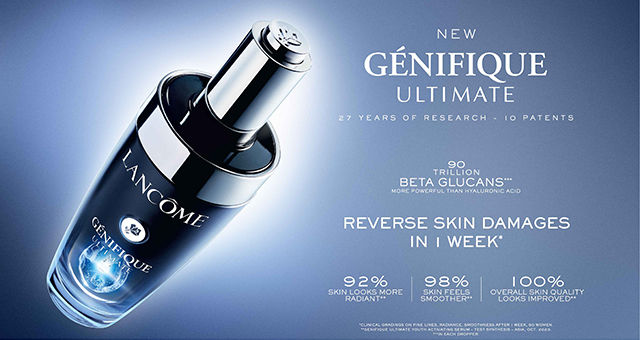


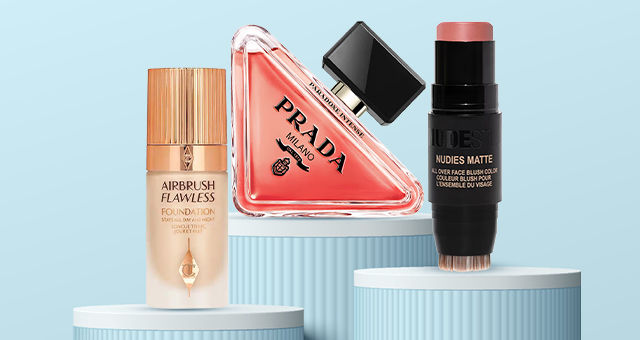
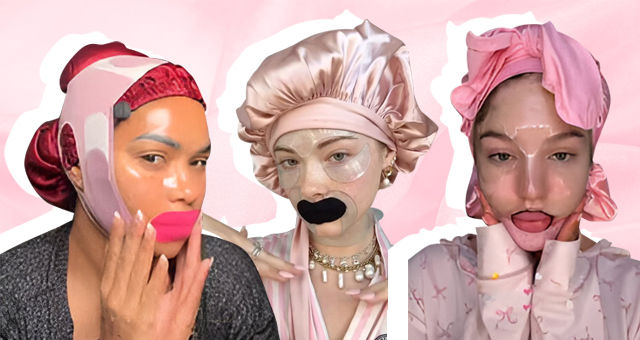
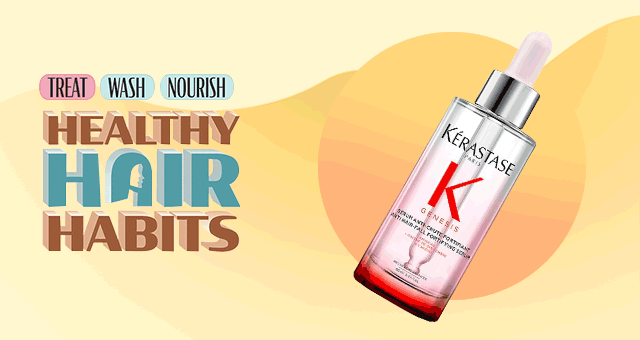

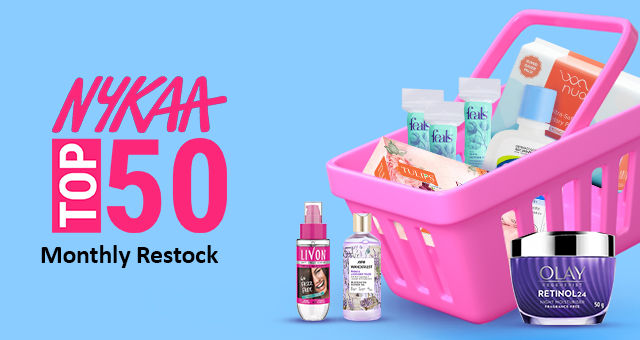
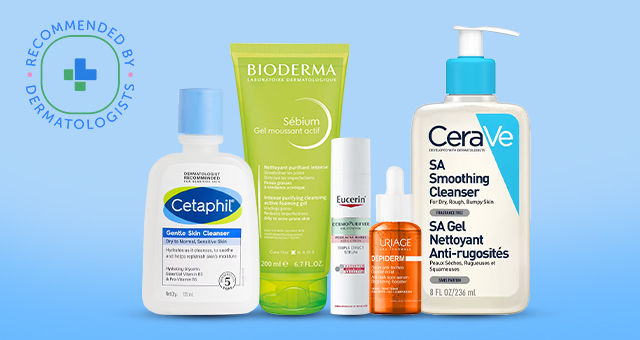
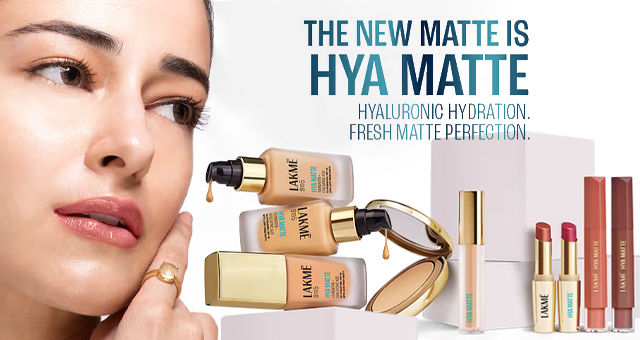
Does Sunscreen Cause Acne? Here’s What A Top Dermat Has To Say
Table of Contents:
For a product that has so many delightful benefits, such as protecting your skin from sun damage and preventing fine lines and hyperpigmentation, some sunscreens come with a few downsides. Think formulas that are heavy on the skin and leave that dreadful white cast, and in some cases, even break you out. We’ve all been there at some point in our lives. But fret not, we spoke to Mumbai’s top dermatologist to break down every little detail about this common question – does sunscreen cause acne?
According to dermatologist Dr Jaishree Sharad, two things can cause sunscreen-related breakouts: clogged pores from comedogenic ingredients or sensitivity to chemical UV-blocking agents. In other words, mineral sunscreens can sit on top of your skin and gunk up pores, while chemical ones might irritate vulnerable skin. However, a study has also shown that specifically formulated sunscreens can decrease inflammation, curb post-inflammatory pigmentation, reduce the possibility of developing lesions, and limit flare-ups. For a lowdown on why sunscreens are non-negotiable in your skincare routine, click here.
Read on as Dr Jaishree Sharad gives you the 411 on sunscreen. Plus, consider all your sunscreen-related queries answered.
Q.1 Is my sunscreen breaking me out?
Yes, there are possibilities that your sunscreen might be causing you breakouts.
Q.2 Ingredients and types of sunscreens to avoid if you have sensitive or acne-prone skin:
Q.3 Does not wearing sunscreen make acne worse?
Yes, most certainly. Following are the reasons why not wearing a sunscreen can worsen acne :
Q.4 What type of sunscreen is best for acne-prone/sensitive skin?
Q.5 Final Thoughts?
Wow, so many great lessons on sunscreens for acne-prone skin, wasn’t it? Now that you know what an expert recommends, let’s look at the right way to apply sunscreen.
How To Apply Sunscreen For Acne-Prone Skin
Step 1: Cleanse your face with a mild cleanser and pat it dry.
Step 2: While your face is still damp, use a lightweight moisturiser or, if you’re using acne treatment, apply your prescribed medication and wait for at least 15–20 minutes.
Step 3: Take two fingers worth of sunscreen and apply thoroughly to the face and neck.
These are some SPFs for sensitive/acne-prone skin that Nykaa Recommends:
Final Takeaway
For acne-prone and sensitive skin, it’s best to opt for lightweight, non-greasy, and non-comedogenic sunscreens. If you’re using topical treatment or ingredients like retinoids and salicylic acid or physical procedures, please remember to apply sunscreen daily for sun protection!